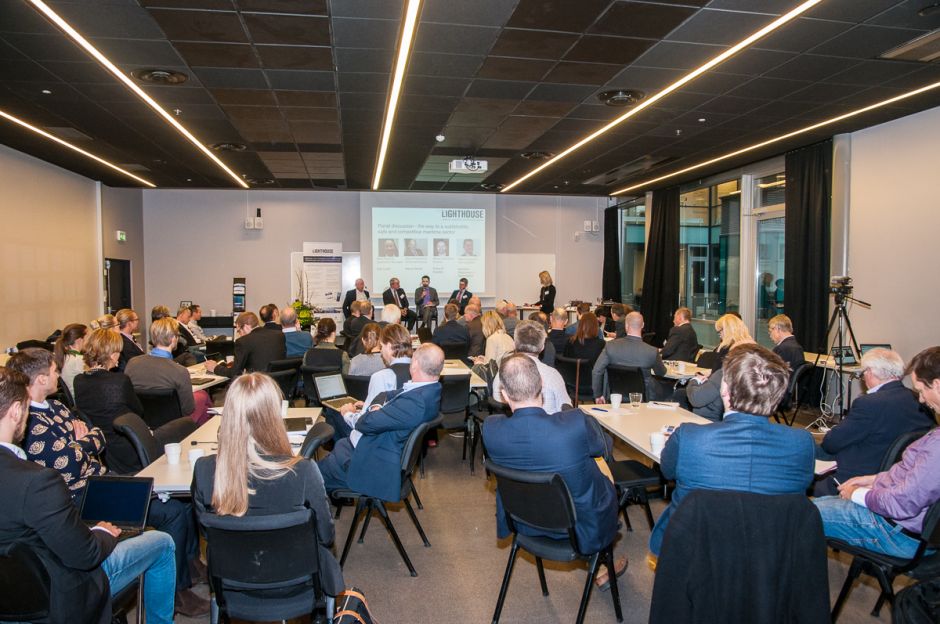Lighthouse pre studies for 2017 announced

Positioning of vehicles on board Ro-Ro vessels, green sea transports, improved performance forecasts and calculation of transport work and emissions. These are topics, presented at the Lighthouse Workshop, that Lighthouse will put some extra effort into during 2017 through Lighthouse pre-studies.
As part of the work towards a sustainable maritime sector, Lighthouse initiates and coordinates relevant research and innovation based on the needs of industry and society. One way is through the various pre-studies Lighthouse initiates. For the year 2017, the Lighthouse program committee and board of directors decided on four new studies.
- It's very exciting. They touch key areas that reflect the width of the maritime sector. The preliminary studies have a number of initial participants, but there is room for more stakeholders to get involved. Contact us and we will help, says Åsa Burman Lighthouse Operations.
Lighthouse pre-studies should:
- Help achieve Lighthouse vision of a competitive, sustainable and safe maritime sector with a good working environment.
- Help reach Lighthouse objective of significantly increased research funding for the maritime sector
- Increase cooperation between the parties in the Lighthouse program committee and the Lighthouse Network
- Give clear and tangible results that are of benefit for Lighthouse and partners in the form of larger projects, research programs or major research applications.
- Engage new external stakeholders
New pre-studies for 2017
Improved performance forecasting and optimisation of ship operation
When a new vessel is to be built, there is a need to evaluate the design and compare different concepts. But current methods to predict the vessel's performance needs to be improved to meet the new requirements. For example, today vessels are designed to be energy efficient in waves and in various loading conditions. The solution is the development of hybrid methods where experiments and computer simulations are combined to ensure reliable forecasts. The feasibility study will formulate a research proposal that will eventually lead to improved testing methods to predict vessel performance.
Initiating parties: SSPA, Chalmers, KTH, Stena
Prioritised area: Innovative shipping concepts and naval architecture
Calculation of transport work and emissions in MRV (EU system for Monitoring, Reporting, Verifying)
EU system, Monitoring, Reporting, verifying (MRV), means that ships moving in the waters around EU should report their CO2 emissions and transport work. The feasibility study will answer how MRV data can be used by the maritime sector for the calculations of the environmental performance of shipping. The feasibility study's overall objective is to contribute to the reduction of greenhouse gas emissions and provide a better understanding of industry challenges around MRV.
Initiating parties: IVL, Chalmers
Prioritised area: Evaluation and reduction of any negative effects shipping has on the climate, environment and public health • Financial incentives to support transition to sustainability within the maritime industry
In-door positioning of RoRo-vessels
To load a RoRo vessel is a complex task and the industry has called for a system that can automate the collection of vehicle position data and register the vehicles on-board ships. Such a system would provide a faster workflow and increase safety by knowing, for example, where gas-powered or battery-powered vehicles are placed and this could also possibly improve firefighting on-board a ship. By knowing the position and vehicle data, stability of the vessel can also be optimized during loading. The goal of the study is to identify a possible concept to enable in-door positioning of vehicles and other cargo on-board RoRo-vessels.
Initiating parties: Viktoria Swedish ICT, Wallenius Wilhelmsen Logistics, Stena
Prioritised area: Maritime informatics • Maritime safety
Green sea transport - prerequisites for the concept of ”green shipping" services at sea
In several sectors, climate-neutral transports have been developed and marketed by introducing a different systems approach. The overall objective of the study is to initiate a market-driven introduction of climate-neutral fuels in shipping. The feasibility study will clarify the technical, practical, economical and market aspects that are relevant to the maritime sector and its customers and provide knowledge on how to introduce drop-in shares of climate-neutral fuels in existing tonnage.
Initiating parties: IVL, School of Business, Economics and Law at the University of Gothenburg
Prioritised area: Integrated transport systems and business models • Evaluation and reduction of any negative effects shipping has on the climate, environment and public health • Alternative energy for ship propulsion and energy supply
-
 DNV: Metanol är ett moget alternativt bränsle
DNV: Metanol är ett moget alternativt bränsle -
 Se Hållbar sjöfarts uppsamlingsheat
Se Hållbar sjöfarts uppsamlingsheat -
 NextWave – en podd som ska locka unga
NextWave – en podd som ska locka unga -
 Ny studie: Eldrivna pendelbåtar kan effektivisera Stockholms kollektivtrafik
Ny studie: Eldrivna pendelbåtar kan effektivisera Stockholms kollektivtrafik -
 Sjöfartens utsläpp ökar
Sjöfartens utsläpp ökar -
 Sociala relationer påverkar val av bränsle
Sociala relationer påverkar val av bränsle -
 Sjöfartens omställning kräver ”mjukare” påtryckningar
Sjöfartens omställning kräver ”mjukare” påtryckningar -
 Hon hade avtalad tid med Kapten ynkrygg
Hon hade avtalad tid med Kapten ynkrygg -
 Lighthouse omvärldsanalys 2025 – osäkerhet och tullar präglar sjöfarten
Lighthouse omvärldsanalys 2025 – osäkerhet och tullar präglar sjöfarten -
 Se seminariet Shipping in the Marine Environment
Se seminariet Shipping in the Marine Environment

